- Home
- Carlos Ruiz Zafón
The Prisoner of Heaven Page 7
The Prisoner of Heaven Read online
Page 7
On selected occasions, Mauricio Valls served them teacakes and a glass of muscatel, and if, despite the hard times and poor nutrition, they were still attractive enough to pinch he would read them some of his writings and confess that his marriage to an ailing spouse was a trial of sanctity imposed upon his manhood. He’d then go on about how much he deplored his job as a jailer and how he considered it humiliating for a man of such high culture and refinement to be confined to that shameful post, when his natural destiny was to be a part of the country’s higher echelons.
The advice from the more experienced prisoners was not to mention, and if possible not even think about, the governor. Most of them preferred to talk about the families they had left behind and the life they remembered. Some had photographs of girlfriends or wives which they treasured and would defend with their lives if anyone tried to snatch them away. More than one prisoner had told Fermín that the first three months were the worst. Afterwards, once you lost all hope, time began to go faster and the senseless days deadened your soul.
5
On Sundays, after mass and the governor’s speech, some of the prisoners would gather in a sunny corner of the courtyard to share a cigarette or two and listen to the stories David Martín would tell them, when his mind was clear. Fermín, who knew them all because he’d read the entire City of the Damned series, would join the group and let his imagination fly. But often Martín didn’t seem to be fit enough even to tell them the time of day, so the others would leave him alone while he wandered around talking to himself. Fermín observed him closely, following him at times, because there was something about that poor devil that broke his heart. Using all his cunning and wily tricks, Fermín would try to obtain cigarettes for him, or even a few lumps of sugar, which Martín loved.
‘You’re a good man, Fermín. Try not to let it show,’ the writer would tell him.
Martín always carried an old photograph on him, which he liked to gaze at for long spells. It showed a man dressed in white, holding the hand of a girl of about eight. They were both watching the sunset from the end of a wooden jetty that stretched out over a beach, like a gangway suspended over crystalline waters. Usually, when Fermín asked him about the photograph, Martín didn’t reply. He would just smile, before putting the picture back in his pocket.
‘Who is the girl in the photograph, Señor Martín?’
‘I’m not sure, Fermín. Sometimes my memory lets me down. Doesn’t that happen to you?’
‘Of course. It happens to everyone.’
It was rumoured that Martín was not altogether in his right mind, but soon after Fermín started to befriend him he realised that the poor man was far worse than the rest of the prisoners assumed. There were moments when he proved more lucid than anyone, but often he didn’t seem to understand where he was and he spoke about people and places that obviously existed only in his imagination or memory.
Often Fermín would wake up in the early hours and hear Martín talking in his cell. If he drew stealthily up to the bars and listened carefully, he could hear him clearly arguing with someone he called ‘Señor Corelli’ who, judging by the words he exchanged with him, appeared to be a notoriously sinister character.
On one of those nights Fermín lit the remains of his last candle and raised it in the direction of the opposite cell. He wanted to make sure Martín really was alone and that both voices, his own and the other voice belonging to the person called Corelli, were coming from the same lips. Martín was walking in circles round his cell, and when their eyes met, Fermín realised that his prison mate couldn’t see him. He was behaving as if those walls didn’t exist and his conversation with that strange man was taking place far from there.
‘Pay no attention to him,’ murmured Number 12 from the shadows. ‘He does that every night. He’s off his trolley. Lucky him.’
The following morning, when Fermín asked him about the man called Corelli and his midnight conversations, Martín looked at him in surprise and gave him a puzzled smile. On another occasion, when Fermín was so cold he couldn’t sleep, he walked over to the bars again and listened to Martín talking to one of his invisible friends. That night Fermín dared to interrupt him.
‘Martín? It’s me. Fermín, your neighbour across the landing. Are you all right?’
Martín walked over to the bars of his cell and Fermín could see his face was covered in tears.
‘Señor Martín? Who is Isabella? You were talking about her a moment ago.’
Martín stared at him.
‘Isabella is the only good thing remaining in this shitty world,’ he replied after a while, with unusual bitterness. ‘If it weren’t for her, we might as well set fire to the whole thing and let it burn until even the ashes have blown away.’
‘I’m sorry, Martín. I didn’t mean to bother you.’
Martín withdrew into the shadows. The following day he was found shivering in a pool of his own blood. Seeing that Bebo had fallen asleep in his chair, he’d managed to slit his wrists by scratching them against the stone. When they took him away on a stretcher he was so pale Fermín thought he would never see him again.
‘Don’t worry about your friend, Fermín,’ said Number 15. ‘If that was anyone else, he’d go straight into the canvas sack, but the governor won’t let Martín die. Nobody knows why.’
David Martín’s cell was empty for five weeks. When Bebo brought him back, carrying him like a child, dressed in white pyjamas, Martín’s arms were bandaged up to his elbows. He didn’t remember anyone and spent the first night talking to himself and laughing. Bebo placed his chair facing Martín’s bars and kept a close eye on him all night, handing him sugar lumps he’d stolen from the officers’ room and hidden in his pockets.
‘Señor Martín, please don’t speak like that. God will punish you,’ the jailer whispered to him between one sugar lump and the next.
In the real world, Number 12 had been Dr Román Sanahuja, head of General Medicine at Barcelona’s Hospital Clínico, an honourable man, cured of ideological delusions, whose conscience and refusal to denounce his friends had sent him to the castle. As a rule, no prisoner’s line of work was recognised within those walls. Unless such a line could reel in some benefit for the governor. In Dr Sanahuja’s case, his usefulness was soon established.
‘Unfortunately I don’t have adequate medical resources at my disposal,’ the governor had explained to him. ‘Quite frankly, the regime has other worries and doesn’t give a toss if you all rot in your cells from gangrene. After much battling I’ve got them to supply me with a badly equipped medicine cabinet and a washed-up quack who wouldn’t even be accepted as a janitor in a veterinary clinic, I’m sure. But that’s what there is. I know for a fact that before succumbing to the error of neutrality, you were a doctor of some renown. For reasons that are not of your concern, I have a vested interest in ensuring our mutual friend David Martín does not leave us prematurely. If you agree to collaborate and help keep him in reasonably good health, considering the circumstances, I can assure you I will make your stay in this place more agreeable and will personally see that your case is re-examined with a view to shortening your sentence.’
Dr Sanahuja nodded.
‘It has come to my notice that some of the prisoners regard Martín as being rather soft in the head, as you would say. Is that so?’ asked the governor.
‘I’m not a psychiatrist, but in my humble opinion, I believe Martín is clearly unbalanced.’
The governor weighed up that remark.
‘And, according to your expert medical opinion, how long would you say he could last?’ he asked. ‘Alive, I mean.’
‘I don’t know. Conditions in this prison are unhealthy and …’
The governor cut him off with a bored expression.
‘And sane? How long do you think Martín can remain in possession of his mental faculties?’
‘Not long, I think.’
‘I see.’
The governor offered him a cigarette
, which the doctor refused.
‘You like him, don’t you?’
‘I hardly know him,’ replied the doctor. ‘He seems a decent enough man.’
The governor smiled.
‘And an execrable writer. Possibly the worst this country has ever had.’
‘You’re the recognised authority on all matters literary, Governor. I know nothing about the subject.’
The governor gave him an icy look.
‘I’ve sent men into solitary confinement for three months for less impertinent remarks. Few survive, and those who do come back in a worse state than your friend Martín. Don’t make the fatal mistake of assuming that your qualifications grant you any privileges. Your records say you have a wife and three daughters out there. Your luck, as well as that of your family, depends on how useful you make yourself to me. Am I getting this across clearly?’
Dr Sanahuja swallowed hard.
‘Yes, Governor.’
‘Thank you, Doctor.’
From time to time, the governor would ask Sanahuja to take a look at Martín. It was no secret that the governor didn’t trust the resident prison doctor, a dishonest charlatan who seemed to have forgotten the notion of preventive care from signing so many death certificates. The governor dismissed him shortly afterwards.
‘How would you describe the patient’s general state, Doctor?’
‘Weak.’
‘I see. What about his demons, so to speak? Is he still talking to himself and imagining things?’
‘There’s no noticeable change in that regard.’
‘I’ll take that as a yes. I read an excellent article in the ABC by my good friend Sebastián Jurado, in which he talks about schizophrenia, the poets’ illness.’
‘I’m not qualified to make such a diagnosis.’
‘But you are, I hope, qualified to keep him alive, aren’t you?’
‘I’m doing my best with what I’ve got.’
‘Your best may not be good enough. Consider the plight of your daughters. So young and vulnerable. So unprotected and with all those callous swine and reds still hiding out there.’
As the months went by, Dr Sanahuja became quite fond of Martín and one day, while sharing cigarette stubs, he told Fermín what he knew about the man whom some, because of his ravings and his status as the prison’s resident lunatic, had jokingly nicknamed ‘the Prisoner of Heaven’.
6
‘Truth be told, I think that by the time they brought David Martín here he’d already been ill for some time. Have you ever heard of schizophrenia, Fermín? It’s one of the governor’s favourite new words.’
‘It’s what we civilians like to refer to as “being off one’s rocker”.’
‘It’s no joke, Fermín. It’s a very serious illness. Not my speciality, but I’ve seen a few cases and the patients often hear voices, or they see and remember people and events that have never taken place … The mind slowly deteriorates and the patient can no longer distinguish between reality and fiction.’
‘Like seventy per cent of Spaniards … And do you think poor Martín suffers from this illness, Doctor?’
‘I’m not sure. As I said, I’m not a specialist, but I’d say he shows some of the most common symptoms.’
‘Perhaps in this case his illness is a blessing …’
‘It’s never a blessing, Fermín.’
‘And does he know that he is, shall we say, affected?’
‘Madmen always think it’s the others who are mad.’
‘That’s what I was saying about seventy per cent of Spaniards …’
A guard was watching them from the top of a sentry box, as if he were trying to read their lips.
‘Lower your voice or we’ll get into trouble.’
The doctor signalled to Fermín to turn around and walk towards the other end of the courtyard.
‘In times like these, even walls have ears,’ said the doctor.
‘All we need now is for the walls to grow half a brain between the ears and we might get out of this mess,’ answered Fermín.
‘Do you know what Martín said to me the first time I was told by the governor to give him a medical examination?
‘“Doctor, I think I’ve discovered the only way of getting out of this prison.”
‘“How?”
‘“Dead.”
‘“Can’t you think of a more practical way?”
‘“Have you read The Count of Monte Cristo, Doctor?”
‘“As a kid. I barely remember it.”
‘“Well, reread it. It’s all there.”
‘I didn’t want to tell him the governor had ordered all books by Dumas to be removed from the prison library, together with anything by Dickens, Galdós and many other authors whose works he considered rubbish for entertaining the uncultured masses. He replaced them with a collection of some of his own unpublished novels and short stories, together with books by friends of his, bound in leather by Valentí, a prisoner with a graphic arts background. Once Valentí had handed in his work, the governor let him die of exposure, forcing him to spend five nights out in the yard, in the rain, in the middle of January, just because he’d joked about the elegance of the governor’s prose. Valentí managed to leave this place through Martín’s method: dead.
‘After I’d been here for some time, listening to conversations among the jailers, I realised that David Martín had come to the prison at the request of the governor himself. He was being held at La Modelo Prison, accused of a string of crimes which I don’t think anyone really believed he’d committed. Among other things, they said he’d killed his mentor and best friend in a fit of jealousy – a wealthy man called Pedro Vidal, a writer like him – as well as Vidal’s wife, Cristina. People also said he’d cold-bloodedly murdered a number of policemen and someone else, I can’t remember who. These days they accuse so many people of so many things, you just don’t know what to make of it. I find it hard to believe that Martín is a murderer, but it’s also true that during the war years I saw so many people on either side remove their mask and show who they really were, that anything seems possible. Everyone casts the stone and then points a finger at his neighbour.’
‘If I were to tell you …’ remarked Fermín.
‘The fact is that the father of this Vidal character is a powerful industrialist, stinking rich. They say he was one of the key bankers on the national side. Why is it that all wars are won by bankers? Anyway, this magnate, Vidal, personally asked the Ministry of Justice to find Martín and make sure he rotted in prison because of what he’d done to his son and his daughter-in-law. Apparently, Martín had fled the country and been on the run for almost three years when they found him near the border. He couldn’t have been in his right mind to return to Spain where they were waiting to crucify him – at least, that’s what I think. And to make matters worse, this happened during the final days of the war, when thousands of people were crossing over in the opposite direction.’
‘Sometimes one just gets tired of fleeing,’ said Fermín. ‘The world’s very small when you don’t have anywhere to go.’
‘I suppose that’s what Martín must have thought. I don’t know how he managed to cross the border, but some Puigcerdà locals notified the Civil Guards after they’d seen him wandering around the town for days, dressed in rags and talking to himself. Then some shepherds said they’d seen him on the Bolvir road, a couple of kilometres from Puigcerdà, near a large old house called La Torre del Remei, which in wartime had been turned into a hospital for wounded soldiers. It was run by a group of women who probably felt sorry for Martín and, taking him for a soldier, offered him shelter and food. When the Civil Guards got there he’d already left, but that night they caught him walking over the frozen lake, trying to make a hole in the ice with a stone. At first they thought he was trying to commit suicide, so they took him to Villa San Antonio, the sanatorium. Apparently one of the doctors there recognised him – don’t ask me how – and as soon as his name reached the milit
ary headquarters he was transferred to Barcelona.’
‘The lion’s den.’
‘You can say that again. It seems the trial barely lasted two days. The list of accusations against him was endless and although there was hardly any evidence or proof of any sort to sustain them, for some strange reason the public prosecutor managed to produce a good number of witnesses. Dozens of people filed through court, showing such zealous hatred for Martín that even the judge was surprised – no doubt they had all been given handouts by the elder Vidal. Among them were old colleagues of Martín’s from the years when he worked for a minor newspaper called The Voice of Industry. Coffee-shop intellectuals, poor devils and envious pricks of all sorts came out of the woodwork to swear that Martín was guilty of everything he was accused of, and more. You know how things work here. On the judge’s orders, and Vidal senior’s advice, all his works were confiscated and burned, being considered subversive material, immoral and contrary to decent behaviour. When Martín declared in the trial that the only decent behaviour he defended was reading, and anything else was the reader’s business, the judge added another ten years to the sentence he’d already given him. It seems that instead of keeping his mouth shut during the trial Martín replied to everything he was asked without mincing his words, and ended up digging his own grave.’
‘Everything can be forgiven in this world, save telling the truth.’
‘The fact is, he was given a life sentence. The Voice of Industry, owned by Vidal senior, published a long piece listing all his crimes, and to cap it all, an editorial. Guess who signed it.’
‘Our illustrious prison governor, Don Mauricio Valls.’
‘The very one. He described him as “the worst writer in history” and was delighted that his books had been destroyed because they were “an affront to humanity and good taste”.’

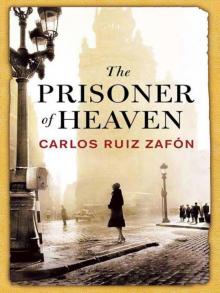 The Prisoner of Heaven
The Prisoner of Heaven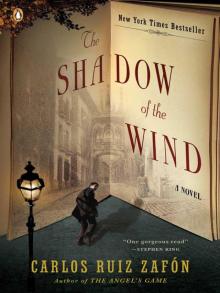 The Shadow of the Wind
The Shadow of the Wind Marina
Marina The Angel's Game
The Angel's Game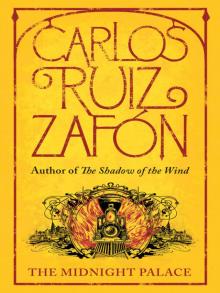 The Midnight Palace
The Midnight Palace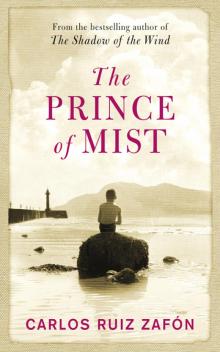 The Prince of Mist
The Prince of Mist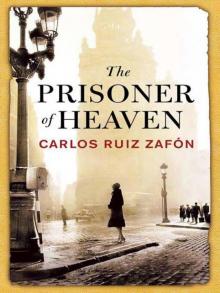 The Prisoner of Heaven: A Novel
The Prisoner of Heaven: A Novel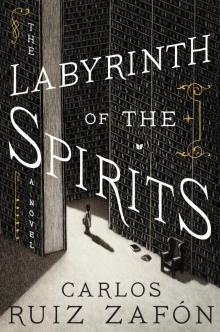 The Labyrinth of the Spirits
The Labyrinth of the Spirits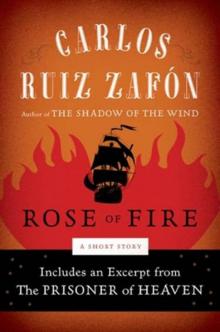 Rose of Fire
Rose of Fire